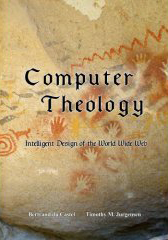PRESS
COMPUTER THEOLOGY |
||||
|
Administrative systems have the general capability to enforce
the consequences of interactions prior to the occurrence of the interaction
proper. Such systems typically make use of credentials issued to persons that
attest to their having achieved some status allowing them to participate in
certain types of interactions. Probably the simplest example is the driver
license, a credential issued by the state that attests to a person having
demonstrated an acceptable level of competence to operate a motor vehicle. More
complex examples entail the issuance of credentials that allow their bearers to
practice law, practice medicine, or to be a certified engineer trusted in the
construction of buildings, bridges and the like. The operators of heavy trucks
require a credential as do the pilots of commercial and private aircraft. In
all of these administrative systems, an infrastructure is put in place allowing
a person to be tested for competence in some area and to have a credential
issued when this faculty is demonstrated. Lest
administrators be underestimated, we should make at least passing reference to
perhaps the most powerful single administrative facility within the United
States Government, the Internal Revenue Service. This agency has extraordinary
power to deal with the enforcement of tax law. The Supreme Court has generally
held that this unique power is well grounded within the Constitution. The
general interpretation is that a state has the ultimate right to survive, an
interesting example of multi-level selection. The ability to levy and collect
taxes is a central feature of survival. Consequently, this ability on the part
of the federal government will actually trump many conflicting rights held by
individuals. Evolution
of a Basic Social Ecosystem
A simple
metaphor allowed the emergence of the salient characteristics of the World Wide
Web. Based on our earlier consideration of petitionary prayer, we suggest that
the metaphor is well illustrated by the statement: Grant me this. Interpreted
either as a humble supplication or as a command imperative, this sentence forms
an iconic example of deictic discourse. It appears deceptively simple and hence
acceptably supported by the current incarnation of the Web. However, its
interpretation becomes considerably more involved when at least some of the
additional inferred elements are made explicit: (You) (please) grant (to) me this (content) (here or where) (now or
when) (since I need it because…) (and I am allowed to have it because…) (and
you are allowed to give it to me because…) (and we will exchange consideration according
to our negotiated basis of commerce) (and conclude our interaction according to
the covenant relationship under which it is conducted). When considered in its full semantic guise as a formally posed transaction, the seemingly simple supplication or imperative gives way to a complex interaction within a well-defined social ecosystem. We suggest that its full derivation arises from the concept of prayer, pursued through a structured protocol with a recursive reference to an overarching covenant relationship. Delving just a bit into a more detailed parsing, consider the expansion of the personal pronouns. “You” can refer to another person, an inanimate individual entity, a group or even a deity. “Me” refers to the speaker, but this could take any of the forms that “you” might take. “This” is a direct, metaphorical indicator establishing reference to some content whose identity can be established within the social ecosystem. It is resolved through a selection vector which leads from the speaker |
||||
|
||||
© Midori Press, LLC, 2008. All rights reserved for all countries. (Inquiries) The contents of ComputerTheology: Intelligent Design of the World Wide Web are presented for the sole purpose of on-line reading to allow the reader to determine whether to purchase the book. Reproduction and other derivative works are expressly forbidden without the written consent of Midori Press. Legal deposit with the US Library of Congress 1-33735636, 2007.
|
ComputerTheology Intelligent Design of the World Wide Web Bertrand du Castel and Timothy M. Jurgensen Midori Press, Austin Texas 1st Edition 2008 (468 pp) ISBN 0-9801821-1-5 |
Book available at Midori Press (regular) |
